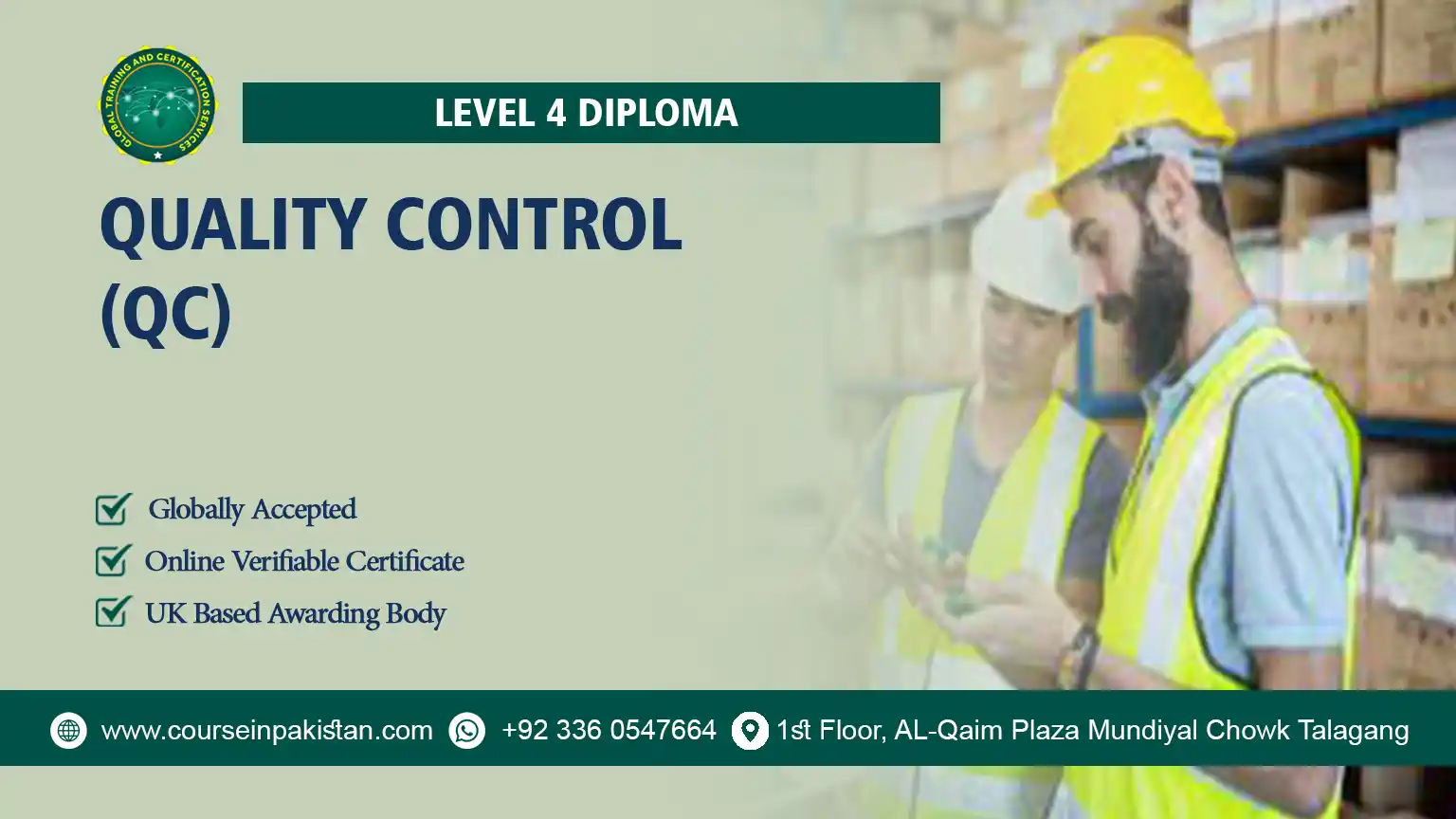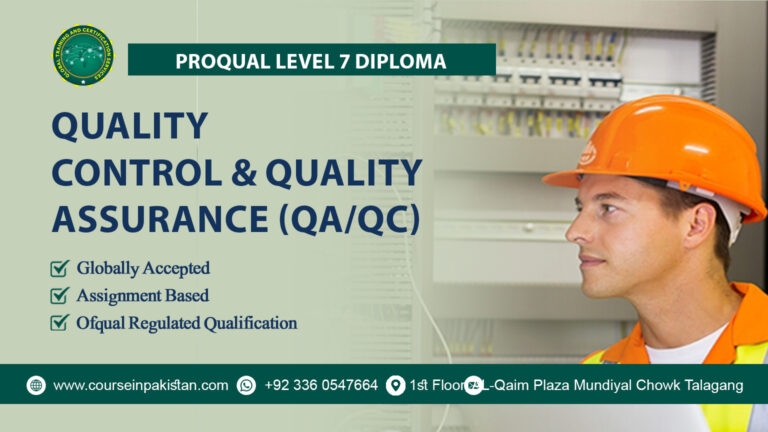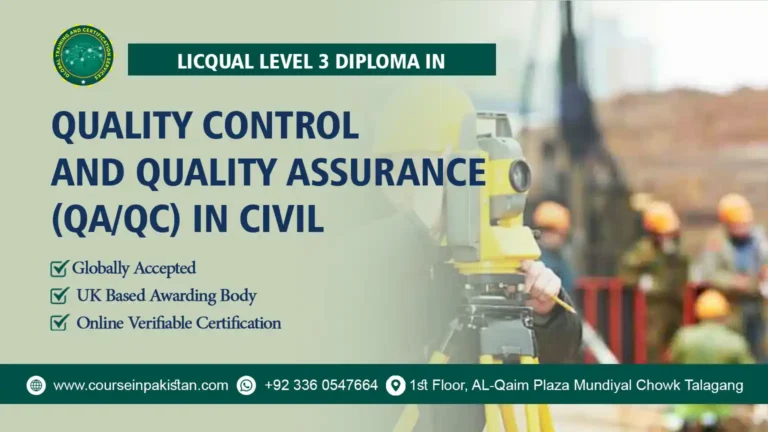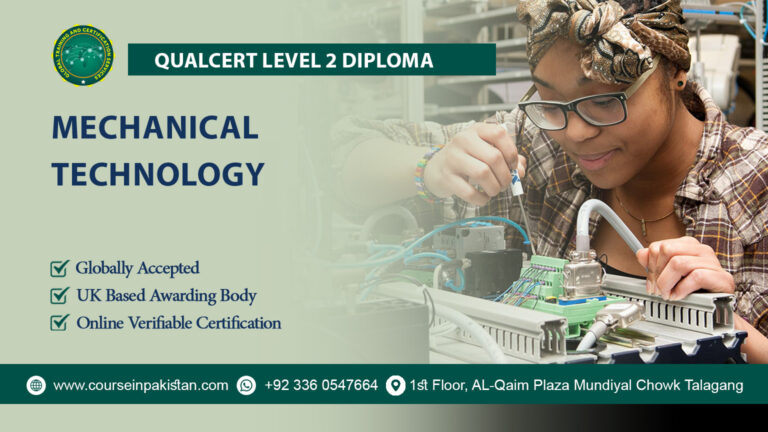
Level 4 Diploma in Quality Control (QC)
Quality control is pivotal in ensuring that products and services meet stringent standards of excellence, which is essential for organizational success and customer satisfaction. The Level 4 Diploma in Quality Control equips individuals with fundamental skills and knowledge to effectively manage and improve quality assurance processes within various industries. This diploma program is designed to provide participants with practical insights and theoretical foundations essential for advancing their careers in quality management.
The Level 4 Diploma in Quality Control offers a comprehensive curriculum tailored to individuals seeking to deepen their understanding of quality management principles and practices. It focuses on equipping participants with the necessary tools to implement quality control measures, optimize processes, and uphold industry standards.
This diploma program covers a range of essential topics in quality control:
- Quality Management Fundamentals: Understand the basic principles and concepts of quality management.
- Quality Assurance Techniques: Learn practical methods to monitor, evaluate, and maintain product/service quality.
- Regulatory Compliance: Navigate regulatory requirements and ensure adherence to industry standards.
- Process Improvement: Implement strategies to enhance operational efficiency and reduce defects.
- Statistical Analysis: Use basic statistical tools to analyze data and make informed quality decisions.
- Quality Documentation: Develop skills in documenting quality procedures and maintaining records.
- Supplier Management: Understand the importance of managing supplier relationships to ensure consistent quality.
- Ethics and Professionalism: Emphasize ethical practices and professionalism in quality control roles.
Course Benefits
- Enhanced Knowledge: Gain a solid understanding of quality control principles and methodologies.
- Career Advancement: Open doors to roles such as Quality Control Technician, Quality Inspector, or Quality Assurance Coordinator.
- Industry Relevance: Acquire skills that are directly applicable across various sectors and industries.
- Practical Skills: Develop hands-on experience through practical exercises and case studies.
- Professional Development: Build a strong foundation for pursuing advanced certifications and higher-level qualifications in quality management.
Course Study Units
-
Aspiring Quality Control Professionals
-
Existing Quality Control Practitioners
-
Mid-Level Managers and Supervisors
-
Industry Professionals
-
Entrepreneurs and Business Owners
-
Regulatory and Compliance Personnel
-
Continuous Improvement Enthusiasts
-
Academic and Training Institutions
Learning Outcomes
Upon successful completion of the Level 4 Diploma in Quality Control, students will be equipped with the following competencies:
Introduction to Quality Control
- Define the core principles and significance of quality control across various industries.
- Differentiate between Quality Control (QC) and Quality Assurance (QA) and explain their relationship.
- Identify the key roles and responsibilities of professionals in quality control.
Quality Management Systems
- Understand the framework and core principles of Quality Management Systems (QMS).
- Implement ISO 9001 standards within organizational processes.
- Develop and maintain efficient document control and record-keeping practices.
Statistical Process Control (SPC)
- Apply fundamental statistical concepts in quality control processes.
- Construct and interpret various types of control charts.
- Conduct process capability analysis to evaluate and enhance process performance.
Quality Auditing
- Understand different types of quality audits and their respective objectives.
- Plan and execute internal and external audits effectively.
- Prepare thorough audit reports and ensure timely follow-up on corrective actions.
Continuous Improvement Techniques
- Explain the significance of continuous improvement in quality control.
- Implement Lean manufacturing principles to reduce waste and improve efficiency.
- Apply Six Sigma methodologies to identify and resolve quality-related challenges.
Problem-Solving Techniques
- Conduct root cause analysis to identify the root causes of quality issues.
- Utilize Failure Mode and Effects Analysis (FMEA) to proactively address potential failures.
- Develop and implement corrective and preventive actions (CAPA) to resolve and prevent quality issues.
Quality Tools and Techniques
- Use basic quality tools such as check sheets, histograms, Pareto charts, cause-and-effect diagrams, scatter diagrams, flowcharts, and control charts to analyze and improve quality processes.
- Apply advanced quality tools, including Design of Experiments (DOE), Quality Function Deployment (QFD), and Statistical Quality Control (SQC) to enhance product and process quality.
Supplier Quality Management
- Develop criteria and methods for selecting and evaluating suppliers.
- Conduct supplier audits to ensure adherence to quality standards.
- Collaborate with suppliers to enhance and develop their quality performance.
Regulatory and Compliance Requirements
- Identify relevant regulatory standards and understand the compliance environment across industries.
- Ensure products and processes meet regulatory requirements.
- Create and maintain accurate documentation and reports to ensure regulatory compliance.
Case Studies and Practical Applications
- Analyze real-world quality control case studies to understand the practical applications of QC principles.
- Apply the learned QC concepts and tools through hands-on exercises and projects.
- Engage in group discussions and presentations to foster collaborative learning and knowledge-sharing.
By completing this comprehensive course, students will gain the essential knowledge and skills required to excel in quality control and contribute effectively to improving quality standards within their organizations.
Who is This Course For?
The Level 4 Diploma in Quality Control is suitable for:
- Individuals looking to enter the field of quality management and control.
- Professionals seeking to formalize their skills and knowledge in quality assurance.
- Career changers interested in transitioning into quality control roles.
Future Progression for This Course
After completing the Level 4 Diploma in Quality Control, participants can consider:
- Advanced Certifications: Pursue certifications such as Certified Quality Technician (CQT) or Certified Quality Improvement Associate (CQIA) to enhance credibility and expertise.
- Further Education: Enroll in higher-level diploma programs or bachelor’s degree courses in quality management or related fields.
- Career Advancement: Progress into roles with greater responsibility, such as Quality Control Supervisor or Quality Assurance Manager, as their experience and expertise grow.
The Level 4 Diploma in Quality Control provides a solid foundation for individuals looking to establish a career in quality management. It equips participants with essential skills, knowledge, and practical insights to excel in quality control roles and contribute effectively to organizational success and industry standards. Embrace this opportunity to embark on a rewarding journey towards becoming a proficient quality control professional.






